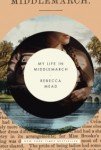I never read the classics when I was in high school. I came of age at the height of open-space education. We had combined social studies and English classes, and our teachers, recent college-graduated hippies, had us read books like Future Shock and Chariots of the Gods. We would then sit on the floor and rap. Yes, rap. But not what you think of nowadays when I say, “Rap.” No rhythm, no music. In those days, rap simply meant to discuss freely, openly, in a climate where every opinion was acceptable. I even won the “most likely to change her mind” award for my sophomore year.
With a background like that it’s not surprising that I was an adult before I read Middlemarch, probably in my thirties. (And it might have been even later before I discovered that George Eliot was a “she.”) I probably bought it because it came in a beautiful little two-book boxed set. I’ve always been a sucker for the beautifully packaged book, like ones with raw or gilt edges.
I fell in love with Middlemarch. But over the years I discovered that few of my friends, even avid-reader friends, liked the book. When I forced Les to watch the (long) movie version he swore it left little numb spots on his brain.
So when I was offered a review copy of Rebecca Mead’s My Life in Middlemarch through Blogging for Books, I jumped at the chance. Here was a kindred spirit, someone who loved Middlemarch at least as much as I did, enough to write about it.
Let’s get my disappointment out of the way. The book was described in a blurb as part memoir, part biography. With a title like My Life in Middlemarch I expected a tale of how Middlemarch changed Mead’s life or how she found her reality imitating Eliot’s fiction. In the Prelude (Eliot’s word choice for Preface), this thought held promise:
But a book can also be where one finds oneself; and when a reader is grasped and held by a book, reading does not feel like an escape from life so much as it feels like an urgent, crucial dimension of life itself. There are books that seem to comprehend us just as much as we understand them, or even more.
I never felt I found out why that was true for Mead.
There’s very little memoir here. The personal references, after the prelude, were predominately those of the “Then I went to the town where Eliot . . .” variety. I wanted to know why or how Mead lived or related to Middlemarch. But once I accepted that it wasn’t that kind of book, wasn’t a memoir at all, I could relax and enjoy My Life in Middlemarch.
Mead uses Eliot’s chapter headings as her own and in each one explores an aspect of Eliot’s life. It’s not chronological, unusual for a biography (which it also isn’t exactly), and it makes for an interesting read. Eliot’s childhood, her unconventional relationships, her friendships and strained family associations are all mined by Mead. She shows how these real-life characteristics are brought into fictional existence in the world and lives of Middlemarch.
I loved discovering how the Eliot’s writing process worked and the way the book, really eight books, evolved. Mead’s description of the homes where Eliot lived and the towns that held her made me long for another trip to England.
Mead is an outstanding writer, and I hope someday she will produce that memoir I was looking for. But maybe she finds Eliot’s life far more interesting and prefers to have it said of her as it was of Dorothea in the last sentence of Middlemarch:
But the effect of her being on those around her was incalculably diffusive: for the growing good of the world is partly dependent on unhistoric acts; and that things are not so ill with you and me as they might have been, is half owing to the number who lived faithfully a hidden life, and rest in unvisited tombs.
That line has always been my choice of the best closing line of any book. Mead’s description of finding the first draft of that sentence in the manuscript at the British Library, and the violet-colored corrections that make it so powerful, was worth the price of the book (if I’d had to pay for it).
If you are one of the lovers of Middlemarch, or simply wish to discover more about Eliot, I recommend My Life in Middlemarch. And I have an extra copy to use as a giveaway. Simply leave a comment on the blog, Facebook or Twitter saying you want it, and on Friday, I’ll pick a winner.
In the meantime, keep doing those “unhistoric acts” for the “growing good of the world.” We need them more than ever.
For shame! I have never read Middlemarch! Can we still be friends? 🙂 Thanks for your honest review! Sounds like a good one!
Yes, Lisa, we can still be friends! But I’m sure you can get it for free for your Kindle (hint-hint).
Good thinking! 🙂 Would you believe it’s actually 99 cents? Not that I wouldn’t spring for it for that price, but I might have to check it out from the library. For some reason, I want to hold classic books in my hands.
Since we’re confessing, I too have to admit that I didn’t read Middlemarch. I’m going to load it on my Kindle tomorrow. My Life in Middlemarch sounds like a good book to read after I finish reading Middlemarch. Thanks for sharing the review and offering a copy for one of us to win. I appreciate it Carol!
And the winner, chosen through a highly sophisticated pick-a-piece-of-paper method by my husband (without looking) is Lisa Bartelt! Congrats. Lisa, you’ll have to let me know how to get your book to you.